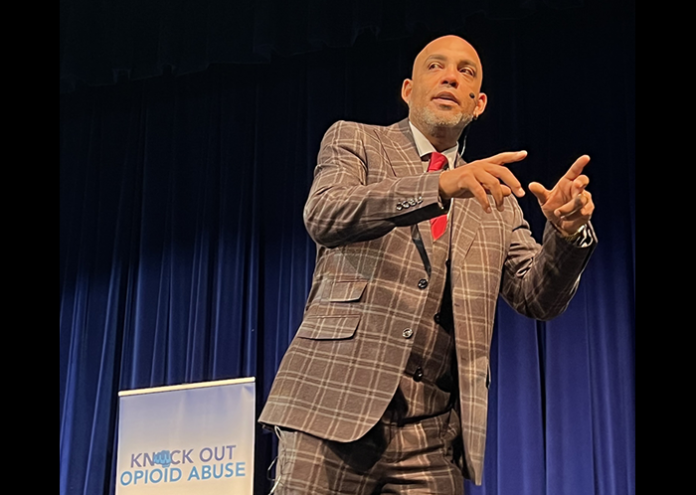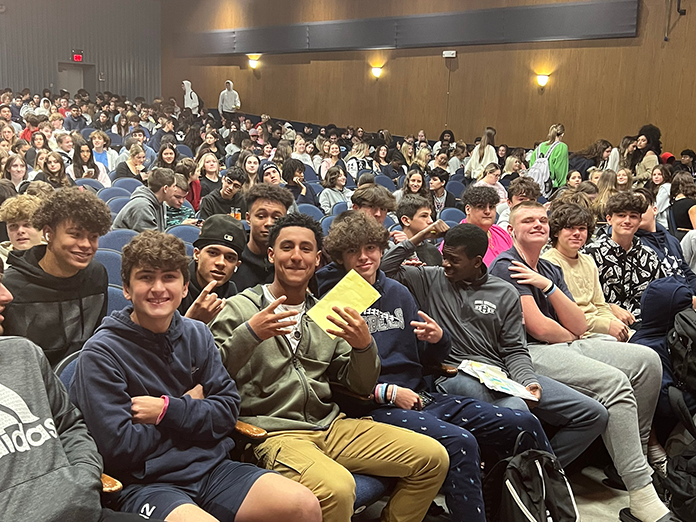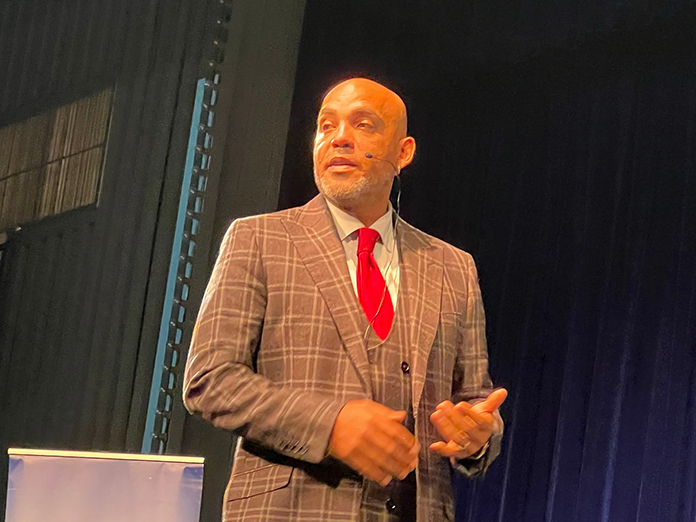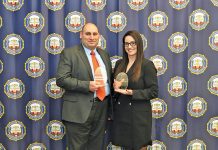
HOWELL – New Jersey’s own football legend, Ray Lucas, was in town last month to tackle the hard-hitting subject of getting hooked on drugs – and the path to his recovery.
An NFL veteran who scored big with the New England Patriots, New York Jets, Miami Dolphins and Baltimore Ravens, Lucas also made Rutgers Scarlet Knights history as a star quarterback.
An audience of 700 Howell High School student athletes sat captivated as Lucas delivered a firsthand testimonial of how he developed an opioid addiction to deal with multiple football injuries.
If ever there was a time for local teenagers to benefit from the words of a sports icon, this was the one. Opioid addiction is still rampant and many cases start from painkillers given after injuries.
Lucas described himself as the “big fish” in Harrison High School, where he now coaches his hometown team. A triple-threat athlete in football, basketball and baseball, Lucas said he didn’t plan to let anything stop him from making it in the sports arena.
Red-shirted as a freshman by the Scarlet Knights, Lucas recalled when the Rutgers coach put him in the game because the opposing team had a bounty on one of the other players. Miami’s Warren Sapp would later make it into the NFL as well.
“Warren Sapp picks me up from behind and drives me to the ground,” shared Lucas. “It tears my rotator cuff, completely off the ball, and broke my collarbone all in the same play.”
Despite the extent of his injury, Lucas returned to the huddle after he heard Sapp “talking crap” about him. He threw the ball as hard as he could for the next play before he tapped his head signaling he needed to get out of the game.
The doctors back then didn’t prescribe Lucas opioids to deal with his pain. The rising star football legend only had Motrin to make it through as he played the next two games with the torn rotator cuff on his throwing shoulder.

Howell High School football players sat in the front row as Lucas went on to describe his first meeting with Bill Parcells, then head coach of the New England Patriots. Everyone wanted to hear how a guy from a small town in Hudson County made it to the big league.
Lucas ultimately fast-forwarded at the place where drugs came into his life.
“As a quarterback, you’re going to be put in situations where you have to absorb the hit and still deliver the ball,” Lucas said. “I was cool with that, although at times it’s not really cool.”
By the time Lucas was in his third year with the Dolphins, he suffered a severe back injury with two herniated discs inverted on his sciatic nerve. Lucas learned he had two options, with the first being surgery and out of the game for good.
The second was one Lucas went with because he was doing what he loved most in life as an NFL professional. He decided on rehabilitation therapy, even though he knew if he got hit hard enough, he could become paralyzed.
As he reflected back, Lucas said it sounded nuts to him that he risked the latter. He’s married to his high school sweetheart and has three beautiful daughters, and the threat was one of life-changing proportions.
“So, I played with it,” shared Lucas. “I started taking pills, but I wasn’t addicted.”
It wasn’t a field injury that ultimately did Lucas in. When he sneezed at practice, he suddenly lost all feeling from the waist down.
After he was released from extensive back surgery, doctors sent Lucas home with 125 milligrams of Roxicodone opioid pain pills. Lucas said the initial effects scared him and he stopped them. His wife called the doctor after he was on the floor shivering for three days. Withdrawal had taken over.
Lucas retired from his football career and went on to work in New York City as an executive. However, he’d also hurt his neck in the game to the point his arms started to flare. His spinal column narrowed to about half its size and Lucas said his neck was collapsing.
“After playing with the NFL for eight years, I was left with all these injuries,” shared Lucas. “After five years, the NFL doesn’t give you insurance and to get covered by my own insurance company would have cost me $1 million.”
When Lucas consulted with the doctor, he learned surgical intervention would run about $500,000. The alternative was giving Lucas pills to handle the pain.
Lucas said he didn’t have an addiction when he left the NFL and determined he had a high tolerance to the medications. After the problem with his neck, the retired professional athlete was up to 1,600 pills a month.

“I could have killed the first seven rows of this audience in one day with the intake at that stage,” Lucas admitted. “When you take that many pills, the mental health starts coming in with depression and doubt.”
By that point, the sports icon had lost all control and swallowed $350,000 worth of the money he earned as an NFL player. Lucas said he’d become a full-blown addict – and submitted he’s still one to this day – despite being clean.
Things got so bad that Lucas plotted jumping off the George Washington Bridge. He called a place for help and told them he was considering suicide. The responding agency apologized as they informed the desperate man they were in the fundraising stage.
A doctor friend recommended that Lucas go see a physician who was helping former NFL players. An EKG revealed that his heart had doubled in size and Lucas was lucky not to have a heart attack.
“For the first time. and in the longest time in my life I prayed,” Lucas said. “I asked God to help me.”
The answer to his prayers came delivered by the love of his life. Lucas said his wife packed him a bag to send him to rehab. Lucas fought every step of the way before he made it to where he is now.
As he looked at the hundreds of young athletes before him, Lucas encouraged them to watch out for themselves and their friends even if it came to just assisting them to find help.
“Injuries happen in high school sports so make sure to ask the questions about what you are being prescribed for pain and ask for help if you need it,” said Lucas. “Addiction does not discriminate. It can happen to anyone at any time.”
Lucas informed the group that after 30 surgeries he’s learned that there’s things like nerve blocks that help the pain as an alternative to pain meds.
“If you can’t deal with the pain after that, you shouldn’t be in this room,” summed up Lucas. “You’re all athletes. We’re different. That’s okay; that’s a good thing.”
At the conclusion of his talk, students were given the opportunity to ask questions. Some appeared more interested in the star athlete’s rise to professional fame. Others grasped for more answers about the perils of addiction.
It’s game on for Lucas as he continues to educate and lead young athletes in the right direction.
The event at Howell High School was part of the Knock Out Opioid Abuse initiative, a program created by the Partnership for a Drug-Free New Jersey and Horizon Blue Cross Blue Shield of New Jersey, in collaboration with the New Jersey State Interscholastic Athletic Association. It was the sixth of 10 events to be held for high school students through the 2022-23 school year.






